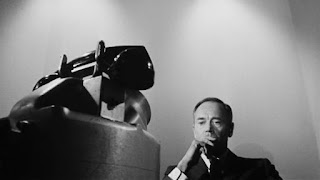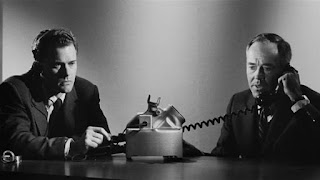The Story: Lots of reasons for doing this scene from Fail-Safe (the theatrical 1964 version directed by Sidney Lumet, not the live-TV version done in 2000, directed by Stephen Frears), and none of those reasons—absolutely none of them—have anything to do with balloons.
So, stand down.
No, I've been wanting to put this scene up because I've already done the similar President/Premier exchange from Dr. Strangelove and it's interesting to do a compare and contrast. The two stories are very much the same—just the occurrence that sparks it and the ultimate horrifying conclusions being a bit nuanced (as if playing with mega-tonnage can be considered "nuanced). Strangelove's source was a 1958 novel by Peter George called "Red Alert", while today's film came from an American best-seller by authors Eugene Burdick (who'd co-written "The Ugly American") and Harvey Wheeler. An out-of-court settlement from a "copyright infringement" suit over "Fail-Safe's" origins resulted in Strangelove being released first, to critical and box-office success, then the next year, Fail-Safe—to critical applause, but negligible box office. Once you see the satire, the serious version seems a lot less serious.
It's why Kubrick took the route he took. He was specifically working out a scene where the U.S. President aids and abets the Russian military to destroy U.S. bombers. Kubrick was not shy of portraying horrific military ironies—he had a French general firing on his own troops in Paths of Glory—but, he balked at this. It IS nuts! No one would believe it. Just like no one would believe a President would bomb one of his own major cities in a retaliatory strike to prevent Armageddon. But, Fail-Safe does that, and with a straight-face and with absolute sincerity. And it comes across as absurd.
It did back then, anyway. These days, who knows what politicians are capable of? They keep surprising us every damn day, with some new absurdity and rather than apologizing, doubling-down on it. I wouldn't be at all surprised to see a politician nuke an American City—especially one that didn't vote for them. That's what we've come to. Apes with nukes.
Well, the scene: It's a full 6 minutes (by Lumet's clocking on the film's commentary track) without a cut, just Henry Fonda and Larry Hagman (Lumet thought it was his first film—it wasn't, he'd been doing TV and theater for awhile), hashing it out with a telephone (the prop was the type of phone they use to relay orders on demolition sites using high explosives) between them without a net and the camera in both of their faces the whole time. It's a high-wire act, and they're both amazing in it.
But, again, you can't help but not think of the crazy: the Premier's coming on-line and asks "How are you?" or Hagman fumbling with his glasses because they won't work with his head-phones—and realizing the absurdity of THAT at a time like this. Fonda gives Hagman a reassuring smile before the phone-call, an odd reflex, and when the call's over, he grabs a glass of water and pushes the decanter to Hagman. This is farce. And they're playing it straight.
Sincerity just doesn't cut it when you're presenting something that beggars the imagination.
The Set-Up: Something's gone wrong! An unidentified aircraft has entered American air-space! No worries! It's an off-course civilian airliner. But Air Force jets have been scrambled—apparently not the only thing—and one of them, Group 6, is on-course to bomb Moscow due to a computer glitch. The president (unnamed, but played by Henry Fonda) is sequestered to a bunker buried far beneath the White House with his translator, Peter Buck (Larry Hagman). There, after learning that USAF attempts to knock down the bombers have been unsuccessful, he calls the Soviet Premier to tell him the bad news.
Action.
THE PRESIDENT:
Buck, I'll talk to the Soviet premier now.
PRESIDENT: You'll translate
what he says to me.
He'll have his own translator
telling him what I say...
PRESIDENT: I think The premier will be saying what he means...but sometimes there's more
in a man's voice than in his words.
PRESIDENT: It's very important the premier and I
understand each other.
I don't have to tell you that.
So I want to know what he's saying
and what you think he's feeling.
PRESIDENT: Any inflection of his voice,
any tone...
any emotion that adds to his words...
I want you to let me know.
PRESIDENT: I know you will.
PRESIDENT: It's all any of us can do.
Don't be afraid
to say what you think.
Don't be afraid all this
is too big for you.
THE PRESIDENT: I'm calling you
on a matter of great urgency.
I hope it turns out
to be a small matter...
but it's the first time
it's happened.
If it's misunderstood,
it could be...
THE PRESIDENT: Yes, Mr. Chairman.
BUCK (translating): I suppose it's another of your
off-course reconnaissance flights.
Mr. President,
we have warned you again and again...that this constant flying
of armed aircraft...
BUCK (translating): ...over Soviet territory...It cannot...
THE PRESIDENT: A group of our bombers each loaded
with two 20-megaton bombs...is flying towards your country.
THE PRESIDENT: We're not sure.
It...it, it might be a mechanical failure.
All I can tell you
is that it's an accident.
It's not an attempt to provoke war.
It's not part of a general attack.
BUCK (translating): How do I know you do not have
hundreds of other planes...coming in so low
our radar cannot pick them up?
THE PRESIDENT: Because I hope to prove to you
that it's an accident...that we take full responsibility...that we're doing everything we can
to correct it.
BUCK (translating): Go on.
THE PRESIDENT: That is correct.
THE PRESIDENT: I did.
BUCK (translating): How do I know that the planes
were not simply diving...
to a low altitude
to escape our radar?
THE PRESIDENT: On our plotting board, the action
could only be interpreted...as planes out of control.
BUCK (translating): We saw, we saw your planes
fall into the sea.
I wanted only
to hear your explanation...and whether it was done
at your own order.
BUCK: Sir, there's someone trying
to persuade him it's a trick.
They want him
to strike back at once.
BUCK (translating): Soviet airspace has still not
been violated, Mr. President.
But if it is, we will be forced
to shoot down your bombers.
THE PRESIDENT: I understand that. I hope you're able
to shoot down our bombers.
But I urge you not to take any steps
that cannot be recalled.
THE PRESIDENT: You also know that if you
launch missiles, we must do the same. If that happens, there'll be
very little left of the world.
THE PRESIDENT: If I may make a suggestion...I will arrange to open
a conference line
between our headquarters
in Omaha and your similar officials
in the Soviet Union.
We will do all we can
to help you.
THE PRESIDENT: As you wish, but I must tell you
what my people tell me.
No matter what you do...at least one of the planes
will get through to the target.
Words by Walter Bernstein
Pictures by Gerald Hirschfeld and Sidney Lumet
Fail-Safe is available on DVD and Blu-Ray from Sony Home Video.































































































No comments:
Post a Comment